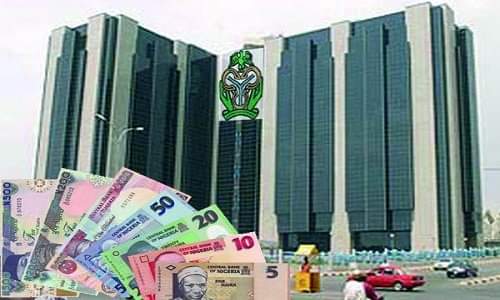
Nigeria’s apex bank, Central Bank of Nigeria (CBN)’s policy initiatives are having salutary effect on much -needed foreign exchange inflows and reserves. Group Business Editor, Simeon Ebulu reports that the recent ‘Naira-4-Dollar Scheme’ has strengthened the country’s foreign exchange position
Nigeria’s apex bank, Central Bank of Nigeria (CBN)’s policy initiatives are having salutary effect on much -needed foreign exchange inflows and reserves. Group Business Editor, Simeon Ebulu reports that the recent ‘Naira-4-Dollar Scheme’ has strengthened the country’s foreign exchange position
In its determination to ensure steady inflow of foreign currency into the economy, the Central Bank of Nigeria (CBN), has consistently been churning out one policy after another to ensure and guaranty that the foreign exchange market remains sufficiently liquid to meet forex demands by end users, be it for medical expenses, school fees settlement for those whose dependants are studying overseas, and to settle payments of imported feedstocks by manufacturers.
There are yet several other reasons unrelated to any of the above why people need forex. Irrespective of the use to which forex is required, either by individuals or corporate entities, it is necessary for the CBN to make it available, especially for those who insist on getting it at the official rate. Apart from the CBN channels, which of course includes the Deposit Money Banks (DMBs) and other certified agents, forex can be sourced in Nigeria, from other unauthorised sources.
These unofficial sources are termed, in Nigeria’s parlance, the black or parallel market. Here, the market is awash with dollars largely obtained from unverified and undefined sources. The black-market is known to everyone who has need to buy or sell the greenback. It’s beside you, along major street corners in most high-brow cities – Lagos, Kano, Port Harcourt, Kaduna and Abuja, just to mention but a few.
The parallel market remains an albatross to the CBN. It prevents, or rather hinders the regulator from keeping a tab on the inflow and outflow of foreign currencies, as transactions there are informal and undocumented. It presents a ready outlet and market for those who require forex at the snap of the finger, those who are averse to following the strict and rigorous regulations and documentations that could expose the intentions for which the forex is required.
Besides, the black market presents a clear preference for most dollar earners and diaspora recipients because the prevailing exchange rates therein are far more in excess of what obtains in the official window. It is even rumoured that the parallel market is largely sustained and funded by the powers that be, which is why it is believed, rightly or wrongly that the CBN is encumbered in taking decisive steps to rein its activities, hurting though they may be to its forex management policies.
But undaunted, the CBN has continued to fan out policies and schemes in the recent past to ensure that it is not outsmarted by the activities of these age-long detractors and nonconformists whose stock in trade is personal gains, as against the wider national interest that the regulator stands for.
Naira-4-Dollar Scheme
The CBN, amongst its other policies, churned out the Naira-4-Dollar Scheme to incentivise Nigerians in the diaspora to continue to remit their forex through designated agents, or International Money Transfer Organisations (IMTOs). According to the CBN in its circular, dated March 5, 2021 and signed by Saleh Jibrin for the Director, Trade & Exchange Department, the scheme was initiated in “effort to sustain the encouraging increase in inflows of diaspora remittances into the country.
Accordingly, all recipients of diaspora remittances through CBN licensed IMTOs shall henceforth be paid N5 for every USD1 received as remittance inflow.
In the light of this, the CBN shall, through commercial banks , pay to remittance recipients the incentive of N5 for every USD1 remitted by sender and collected by designated beneficiary.” It pointed out that “this incentive is to be paid to the recipient whether they choose to collect the USD as cash across the counter in a bank, or transfer same into their domiciliary account.
In effect, a typical recipient of diaspora remittances will at the point of collection, receive not only the USD sent from abroad, but also the additional N5 per USD received.” This scheme is expected to terminate Saturday, May 8, 2021, the bank stated.
The CBN in all its previous policies and regulations bordering on forex, has never been this mild and conciliatory. This scheme, analysts posit, was intended and expected to drive a cord in the minds of those who are bent, fixated in undermining the apex bank’s policies designed to find a lasting, manageable and acceptable solution to the Nigerian forex conundrum.
The CBN Governor, Godwin Emefiele, underlined the goals of the policy when he spoke during Fidelity Bank’s Inaugural Diaspora Webinar on the Implications and Impact of the New FX Policy on Diaspora Investments, that the move was also intended “to increase the transparency of remittance inflows and reduce rent-seeking activities,” assuring that “the new policy measure will encourage banks and financial institutions to develop products and investments’ vehicles geared towards attracting investments from Nigerians in the diaspora”.
He said the new measure would help to make the process of sending remittance through formal bank channels cheaper and more convenient for Nigerians in the diaspora, pointing out that the use of reimbursements of remittance fees had been critical in supporting improved inflow of remittances to countries in South Asia and in improving their balance of payments position following the COVID-19 pandemic.
“Countries in South Asia such as Pakistan and Bangladesh are aware of this impact and they introduced reimbursement schemes to support inflows. In Pakistan the scheme which is known as free send has enabled record amount of inflows of over $2 billion a month even during the COVID pandemic. “Bangladesh introduced its own scheme in June 2019, which is a 2 percent rebate on remittance inflows. Following this action, they have also seen a 20 per cent boost in remittance inflows,” Emefiele stated.
He said the policy is expected to enlarge the scope and scale of foreign exchange inflows into the country with a view to stabilizing the exchange rate and supporting accretion to external reserves. More importantly, it would provide an opportunity for Nigerians living abroad to make investments in their home country.
Reactions
CBN’s Acting Director, Corporate Communications Department, Osita Nwanisobi, praised the policy as a step in the right direction, noting that it will cut cost of remittance from overseas for Nigerians.
He admitted however that much ground was needed to be covered with respect to reimbursements. Some others are of the opinion that the forex subsidy incorporated in the scheme, possibly was designed for the benefits of the ordinary Nigerians more than as an incentive to induce foreign portfolio investments.
To another school of thought, it was a subtle, disguised strategy to devalue the local currency. There are those who though in support of the scheme, expressed reservations about the short period devoted to it, saying it should have been extended to no less than three-to four months.
Foreign reserves increase
The positive accretion to the foreign reserves has been attributed to the Naira-4-Dollar policy which has seen dollar inflows pass through commercial banks, instead of unofficial channels exactly one month after take-off of the scheme.
The foreign reserves, on April 1, stood at $34.85 billion, representing $404 million increase compared to $34.41 billion on March 11. Also, Forex Trading Associate, AZA, a global forex dealer, Oghenefejiro Eduviere, said naira would remain stable on the parallel market, hovering around the N480 to N490 level, as the CBN’s ‘N5 for $1’ incentive scheme encourages forex flows to go through banks.
“We see trading on the Investors and Exporters (I&E) Forex window extending depreciation towards N435 in the short term,” he said in an emailed comment to investors.
No doubt, as the apex bank continues to tweak its policies to meet emerging challenges, recent successes have proven the depth of the foresight of the central banker, true to its calling as a major partner for national developmental agenda.













